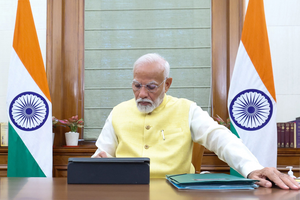New Delhi: In the first 100 days of Prime Minister Narendra Modi-led NDA government’s third term, projects worth Rs 15 lakh crore have been launched with a focus on farmers, women, the middle-class, youths, tribals and minorities, among others.
Since the first term in 2014, the NDA government has consistently focused on the welfare of women, farmers, tribals, youths and minorities. In fact, before even starting the campaign for the 2024 Lok Sabha elections, PM Modi had given several tasks to officials to be completed within the first 100 days of the third NDA government.
Improving farmers’ income
The 17th instalment of Prime Minister Kisan Samman Nidhi was released. As part of the instalment, Rs 20,000 crore has been distributed to 9.3 crore farmers. A government statement said that so far Rs 3 lakh crore have been distributed to 12.33 crore farmers.
The Minimum Support Price for Kharif crops for 2024-25 was increased, which has benefitted 12 crore farmers.
The Centre has also approved seven major schemes with a total outlay of Rs 14,200 crore, including Digital Agriculture Mission to enhance efficiency and productivity in the agricultural sector.
Women empowerment
In the first 100 days, the PM Modi government has awarded certificates to 11 lakh new ‘Lakhpati Didis’. According to government figures, over one crore ‘Lakhpati Didis’ now earn more than Rs 1 lakh every year.
The Centre has established over 90 lakh self-help groups (SHGs) under the Deendayal Antyodaya Yojana-National Rural Livelihoods Mission (DAY-NRLM) for women. This has helped 10 crore women to promote financial inclusion, digital literacy, sustainable livelihoods and social development measures.
On Tuesday, the Prime Minister is scheduled to launch the Odisha government’s flagship women-centric initiative, Subhadra Yojana in the state.
Relief to middle-class
The NDA government announced no tax on income up to Rs 7 lakh, helping salaried individuals save up to Rs 17,500 in taxes.
In a statement, the government said that the standard deduction has been increased to Rs 75,000 and the exemption limit for family pension raised to Rs 25,000.
The government will also conduct a comprehensive review of income tax rules within six months to make them concise, clear and easy to understand, the statement added.
The PM Modi government also implemented a unified pension scheme, under which government employees with 25 years of service will receive 50 per cent of their average basic salary as a pension.
The government has said that under the Pradhan Mantri Awas Yojana, three crore houses were approved — one crore houses under the urban scheme, and two crore houses were approved for construction in rural areas. So far, over four crore houses have been approved in urban and rural regions in India.
Benefits to minorities, tribals
The government has said that under the Prime Minister’s Developed Tribal Village Campaign, 63,000 tribal villages were approved to be developed. This has helped improve the socio-economic status of around five crore tribals.
The Namaste Scheme has been extended to include waste pickers along with sanitation workers, promoting their social and economic empowerment, the government statement said.
The recently introduced Waqf (Amendment) Bill, 2024, represents a major step towards improving the management and preservation of Waqf properties. This legislation will facilitate the creation of a digital platform for online registration and monitoring of Waqf properties. By introducing an online system, the government aims to enhance transparency, reduce disputes, and ensure better management of these important assets. The bill is a significant move towards modernising the administration of Waqf properties and addressing long-standing issues related to their management.
Youth empowerment
The PM Modi-led NDA government has announced a Rs 2 lakh crore package to promote empowerment and skill development among the youth. The goal is to benefit 41 million youth over the next five years.
The government has announced more than 15,000 new appointments and first-time employees are covered under EPFO. An incentive of up to Rs 15,000 will be provided in three instalments, the government has said.
The MUDRA loan has been increased from Rs 10 lakh to Rs 20 lakh, which will greatly help the youths.
Strengthening healthcare
The Ayushman Bharat Scheme has been expanded to include all citizens aged 70 and above under free insurance of up to Rs 5 lakh.
To improve healthcare, 75,000 new medical seats have been added. The government said that this will help the healthcare system become more effective and reduce dependence on foreign medical education.
The National Medical Commission is preparing a National Medical Register to create a centralised repository of doctors in the country.
In line with the vision of ‘Swasth Bharat’, the government has also introduced the Rashtriya Poshan Mission. This flagship programme under the Ministry of Women and Child Development (WCD) seeks to enhance the nutritional status of children, pregnant women, lactating mothers, and adolescent girls.
–IANS


Comments are closed.